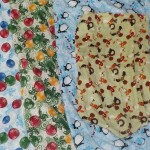The holiday season is here. For most people, this means Christmas shopping. For some, Solstice shopping (is that a thing? I’m…honestly not sure.). Regardless, this time of year seems to cause a sort of crisis of sorts in our culture. On the one hand, advertising and social expectation conspire to drive us into shops, malls, and increasingly websites to buy gifts for friends and family. On the other hand, advice from spiritual leaders and philosophers urges us to reject consumerism and find the “real” spirit of the season.
The rejection of material wealth (in theory) isn’t unique to any particular religion or philosophy. It’s quite common among Christians to bemoan how commercialized and materialistic Christmas has become. Buddhism has, as its basis, a rejection of desire that must include desires for material goods. Hinduism has a long tradition of asceticism among its hundreds, of sects. To be holy, we must be poor.
And yet…
The message of many of these religions is conveyed through religious texts – often beautifully made with expensive materials. In times before the printing press, monks would labour over copies of the Bible for long months (or years), not only copying the text but illustrating and decorating it, making it a thing of beauty. These spiritually inclined-men, often bound by vows of poverty, spent a huge amount of their time actively creating material goods. The rich man could read about his chances of entering heaven (to wit: nil) in a leather bound, gorgeously illuminated manuscript.
Faced with the admonition by Christ himself to sell all their possessions and follow him, almost no one does it. Faced with messages of getting back to basics and nature, many pagans spend hundreds of dollars on exquisitely crafted ceremonial objects. Faced with messages about the ecological dangers of rampant consumerism, the dubiously ethical leatherworker spends a hundred dollars on a new sewing awl haft ( made of Cocobolo, an exotic hardwood of questionable sustainability) and blade (hand forged carbon steel).
Yeah, that last one is me.
This isn’t meant as a condemnation of any particular worldview or group. Something is happening here beneath the surface of all the rhetoric and theology. There’s a commonality here.
Maybe stuff IS important.
Humanity is not the only tool using species. Ravens, Chimpanzees and Octopi spring to mind. But we are without a doubt the most prolific. We spend almost our entire waking lives making, using, inventing or purchasing tools. Clothing? A tool to keep us warm, out of the sun, or make us attractive to the opposite sex. Shoes? A tool to protect our feet. All of our methods of transportation, aside from walking, involve the use of complex tools.
There is no human culture on earth today that does not create and use tools. So what would humanity be without stuff?
Here is my morning routine: I’m woken by my alarm clock at 7:00 AM. I roll out of bed, get dressed, then head to my daughter’s room to visit the indignity of wakefulness upon the poor child. Then I head to the kitchen and start making her lunch for school, using a bread knife and a cutting board, and utilizing food from the refrigerator. I then make breakfast using those same tools, eat it off of my plates, then put on my shoes and coat and walk to work, where I will use various high end electronics to do my office job to earn money.
This money will be used to guarantee the eternal salvation of my rather shoddy soul.
Just kidding, I’ll use it to buy stuff.
So. Stuff is, at the very least, a necessary evil (at least for humans).
This is the refrain from those who reject any kind of materialism and wealth, especially on spiritual grounds. If you must have stuff, get by with the bare minimum, utilitarian tools, shelter and clothing. For best results, have these in common.
This is, by and large, roundly ignored. In sub-cultures that actually strictly enforce these standards, such as monasteries, near constant discipline is needed to prevent members from acquiring small luxuries – and these often fail. There are many parallels to the attempts (often unsuccessful) to enforce celibacy on clergy members and monks. Ultimately, it seems, human theology is flogging the tide of human nature.
Who amongst us does not have a favourite mug? Name an artisan without a favourite tool. Try and convince a sailor his boat doesn’t need a name. Tools are part of how we make our way in the world, integral to our survival, and its natural to impart a sense of possession over things we use every day.
Tools and possessions become extensions of ourselves. Look at the carpenter, their rack of tools razor-sharp, the handles worn smooth and shiny by constant use. They are simple, but excellently made and cared for. Maybe, in the corner, they have one exquisitely made mallet, the handle made of exotic woods with their name engraved in the side. You could find out more about this crafter by examining their tools than you could by speaking to them for an hour. People do not always say what they mean, but they nearly always live what they mean.
So, stuff is not merely a necessary evil. It shapes our thoughts, philosophy and culture. We decorate our clothing with slogans, inside jokes and the faces of cultural icons. They are an outward expression of identity. Our material goods shape our cultures – how many discourses on the evils of materialism have been written from behind the shining screen of an iMac? Look at the emergent Internet culture of the 20th and 21st centuries, so shaped by the nature of networking technology and computers, and by the resulting sense of anonymity.
The blanket condemnation of material culture is a poisonous idea (though possibly spread with the best of intentions). It is true that our escalating consumption is destroying the global ecosystem. It is true that our desire for material luxuries at cheap prices forces people into slavery half a world away. It is true that people can become preoccupied with material wealth, to the detriment of personal relationships.
But when we degrade the value of all material goods, we degrade the humanity of our fellows. Every single item you see around you has been built by someone. Someone spent time and effort to make it. In many cases, they have tried their best to make it well. Given the opportunity, most people will try and make something beautiful.
So here we are faced with a dilemma. On the one hand, our consumption of food, energy, and material goods is driving ecological destruction and contributing to the suffering of our fellow humans. Our personal and cultural identities can be buried in a flurry of cheap consumer goods and mass culture.
On the other hand, it is apparent that the drive to create and use tools and goods is integral to our nature and identity. No amount of spiritual flagellation is going to scour it from our civilization – in the end it just causes people anxiety and stress.
So what can we do?
The first thing I would suggest, especially if you haven’t done it in a while, is to try and make something useful. Knit or crochet a scarf. Forge a knife. Mold a pot or a mug. Think about the time it took you, the materials that went into it, the things that had to be done so that you could make it. Research the history of the craft you chose, even if it’s just a cursory review. If it’s any good at all, keep it for yourself and wear/use it proudly – if it turned out poorly foist it off on some relatives. They’ll love it anyway, even if you make crappy scarves (or leatherwork, as the case may be).
Once you’ve done this, do it again. Winter is on the way and everyone needs a scarf.
(Don’t make anything out of leather, though – you wouldn’t like it and anyway I don’t need any more competition.)
When you’ve done this a few times, you may find you’ve got a new perspective on stuff.
That’s what happened to me, anyway.
A little over a couple years ago, I was adamant (especially to my crafty wife) that I lacked the crafter’s spark. I had no desire to make things (so I said), and that no amount of badgering could overcome such a temperament. Then, one Christmas, as my wife was making felted toys as presents for our daughter and her nephews, I thought about how cool it was that she could do that – take some raw materials and turn it into meaningful gifts. She spent hours and hours on them. Inspired, I cast around for something I was interested in making – and leather caught my eye. With minimal preparation, and far too much money spent on tools and materials, I jumped headlong into leatherwork.
Those first items were awful. I mean, they were objectively bad. I cut thick leather with bad scissors and oh boy, could you ever tell. I used cheap suede lace and the dyes didn’t work and there was no hope of me actually sewing anything. But they were gifts and my parents and brother didn’t look too closely at them (that’s how you know people love you – they see the work and not the item).
The next year, I did better. And seeing how people reacted to the things I had made for them was part of what inspired me to start a side business doing leatherwork. I began to think that people should have well made, beautiful things. Not too many – maybe just one or two, things they used every day, that became part of their routine, that made their day a little better, or their life a little easier. Isn’t that why we invented tools in the first place?
After I started leatherworking, I started looking at things and marvelling at the amount of work that must have gone into them. I wondered where it had come from, and who had made it. I began to think more critically about what I bought and where I bought it from.
I think, perversely, that the message that stuff isn’t important makes it easier to over-consume. After all, if stuff isn’t important, we can just buy it and discard it as we feel like it. We don’t think about the skills, infrastructure, and engineering that goes into every item we buy and use. We just say that stuff isn’t really important, that the material is inferior to the spiritual, and we can keep on ignoring the real issues presented by what we buy and what we make.
Conversely, when you start thinking of stuff as a reflection of your own values, you may become less wasteful. You may be more discerning in your buying habits. You’ll be more willing to mend and repair your stuff because it represents an investment of not only money but also thought. You might be less likely to impulse buy an item you don’t need.
This outlook is fraught with difficulty. When something says Made in Canada, what does that mean? Were the parts made overseas and assembled here, or was it made from scratch? Should I buy something local, or something made internationally, in a country where people badly need employment? How can I find out what the labour practices are of the company that made it? When something says 100% Genuine Leather, is that real leather? (spoiler alert: not really). And what on Earth does hand made even mean, anyway?
Consuming deliberately does not mean basing your entire identity on the things you buy. But it does mean acknowledging what the things you buy mean, what they say to others and how they impact the world around you. I would say that buying fewer things, and enjoying them more,is probably better for you than buying a lot of stuff that just takes up space.
Consumption isn’t the end of it, either: it’s the beginning. Making stuff deliberately is just as important (if not more so). If you work in a manufacturing setting, try and find out more about the entire process, the raw materials and the finished products. Make sure your part in the process is well-done and thoughtful. If your job is like mine (office work, with few tangible, physical end products) try taking up a constructive hobby. There’s nothing wrong with office or service work (a lot of it is quite important) but for me, the leatherwork I do is often more satisfying than my day job. Maybe there’s something in the human brain that just wants to make something and hold it in their hand, something real and beautiful.
I’m not going to say this type of thing is not for everyone. It is for everyone. Every single one of us has an ancestor that made and used tools of some kind. Thousands of years ago, one of your forefathers took a few extra minutes with his antler striker to make sure that flint arrowhead had a pleasing symmetry to it. One of your foremothers took an evening by the fire to carve intricate designs into her spear-thrower, for no other reason than to make it beautiful.
It may be true that we’re all consumers. But then the following is also true:
We’re all makers, deep in our bones. And this time of year, we should remember that.
 Jake Diebolt lives and works in Gore Bay, Ontario – office worker by day, and leather worker by night. He writes when he can wring out a little bit of time in between. You can have a look at what he is up to at Sparrowhawk Leather.
Jake Diebolt lives and works in Gore Bay, Ontario – office worker by day, and leather worker by night. He writes when he can wring out a little bit of time in between. You can have a look at what he is up to at Sparrowhawk Leather.
















